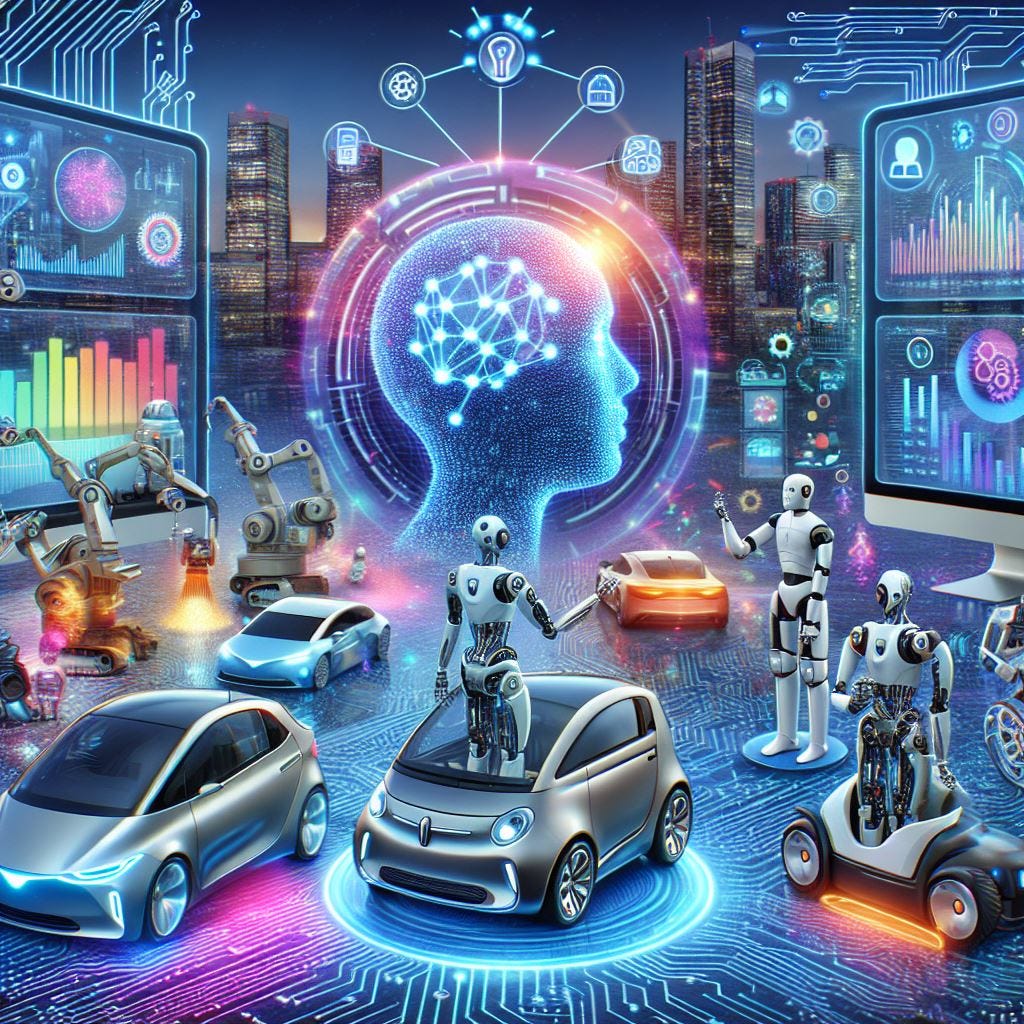AI (Artificial Intelligence) concepts, use cases and learning path
Comprehensive post on understanding AI and shift in the industry and job market
Understanding AI: Concepts for Everyone
Artificial Intelligence (AI) is a fascinating and rapidly evolving field that affects various aspects of our lives. While it might sound complex, the core concepts are quite approachable. Let’s dive into AI in a way that anyone can understand, and explore its impact on the job market and how we can adapt to its advancements.
What is AI?
AI is a branch of computer science that aims to create machines capable of mimicking human intelligence. This includes learning from experience, understanding language, recognizing patterns, solving problems, and making decisions.
Key Concepts:
Machine Learning (ML): A subset of AI, where machines learn from data to improve their performance over time without being explicitly programmed.
Example: When you use a streaming service like Netflix, ML algorithms analyze your viewing habits to recommend shows you might like.
Natural Language Processing (NLP): This involves teaching machines to understand and interpret human language.
Example: Virtual assistants like Siri or Alexa can understand and respond to your voice commands, making daily tasks easier.
Computer Vision: This enables machines to interpret and make decisions based on visual inputs.
Example: Self-driving cars like Tesla use computer vision to detect and navigate around obstacles on the road.
Robotics: Combining AI with physical robots, these machines can perform tasks like assembling products, exploring hazardous environments, or even assisting in surgeries.
Example: Robots in manufacturing plants can assemble products with precision and speed, improving efficiency.
Is AI a Threat to the Job Market?
The impact of AI on the job market is a hotly debated topic. While AI does have the potential to disrupt certain industries, it also presents new opportunities.
Potential Job Displacement:
Automation: AI can automate repetitive and mundane tasks, which may reduce the need for certain jobs. For example, assembly line work, data entry, or even some customer service roles might be replaced by AI.
Skill Shift: Jobs involving routine tasks are more likely to be affected. However, this displacement often leads to a demand for different skills, especially those related to developing, maintaining, and overseeing AI systems.
Job Creation:
New Roles: AI has led to the creation of new job categories, such as data scientists, AI specialists, and machine learning engineers. There are also roles focused on ensuring ethical AI usage, AI system training, and AI system maintenance.
Augmentation: AI can augment human capabilities, allowing workers to focus on higher-level tasks requiring creativity, problem-solving, and emotional intelligence. For example, in healthcare, AI can assist doctors in diagnosing conditions, enabling them to spend more time on patient care.
How Can People Evolve with AI Advancement?
Adapting to AI advancements involves a combination of acquiring new skills, staying flexible, and embracing lifelong learning.
Strategies to Adapt:
Lifelong Learning: Continuously update your skills to stay relevant. Online courses, workshops, and certifications can help you learn about AI and its applications.
Focus on Unique Human Skills: Develop skills that AI cannot easily replicate, such as creativity, emotional intelligence, critical thinking, and complex problem-solving.
Embrace Technology: Use AI-powered tools to enhance your productivity and efficiency. Familiarize yourself with AI applications in your field and learn how to leverage them.
Networking: Connect with professionals in the AI and tech industries. Networking can provide insights into the latest trends and potential opportunities.
Flexibility and Adaptability: Be open to change and willing to adapt to new roles and responsibilities as the job market evolves.
How AI is used in various industries?
AI in the Automotive Industry
AI is transforming the automotive industry in several significant ways:
Vehicle Telematics:
Predictive Maintenance: AI analyzes data from vehicle sensors to predict maintenance needs, reducing downtime and preventing breakdowns.
Example: AI systems in fleet vehicles can monitor engine health and alert drivers to potential issues before they become serious problems.
Fleet Management: AI optimizes routes, monitors driver behavior, and improves fuel efficiency, enhancing overall fleet performance.
Example: AI-powered fleet management systems can suggest more efficient routes based on real-time traffic data.
Infotainment Systems:
Personalized Experience: AI tailors music, navigation, and climate control settings based on user preferences.
Example: AI-enabled infotainment systems can learn your favorite music genres and create custom playlists for your journeys.
Voice and Gesture Control: AI enables hands-free control of infotainment features, improving safety and convenience.
Example: Drivers can use voice commands to control navigation or make phone calls without taking their hands off the wheel.
Dealer Management Systems (DMS):
Inventory Management: AI predicts demand and optimizes inventory levels, reducing overstocking and stockouts.
Example: Dealerships can use AI to forecast which car models will be in high demand and adjust their inventory accordingly.
Customer Relationship Management (CRM): AI provides personalized recommendations and automates follow-ups, enhancing customer satisfaction.
Example: AI-driven CRM systems can send personalized offers to customers based on their previous purchases and preferences.
AI in the EV Charging Industry
AI is playing a crucial role in the EV charging industry by enhancing efficiency, reliability, and user experience:
Smart Charging: AI optimizes charging schedules based on energy prices, grid demand, and user preferences, ensuring cost-effective and efficient charging.
Example: AI systems can schedule EV charging during off-peak hours when electricity rates are lower, saving users money.
Predictive Maintenance: AI predicts when charging stations need maintenance, reducing downtime and improving reliability.
Example: AI can monitor the performance of charging stations and alert technicians to potential issues before they cause failures.
Dynamic Pricing: AI adjusts charging prices in real-time based on factors like time of day and energy demand, encouraging off-peak charging and balancing grid load.
Example: Charging stations can offer lower rates during times of low demand to incentivize users to charge their vehicles.
Energy Management: AI integrates renewable energy sources into the charging process, maximizing the use of green energy and minimizing reliance on non-renewable sources.
Example: AI can prioritize charging with solar or wind energy when available, reducing the carbon footprint of EV charging.
AI in Social Media Tech Companies
AI is also transforming the way social media platforms operate, enhancing user experience, content management, and advertising strategies:
Meta (Facebook, Instagram):
Content Moderation: AI helps detect and remove inappropriate content, ensuring a safer online environment.
Example: Facebook uses AI to identify and remove hate speech, fake news, and harmful content.
Personalized Content: AI algorithms analyze user behavior to personalize the content feed, showing users posts and ads that are most relevant to them.
Example: Instagram's Explore page uses AI to recommend posts based on users' interests and interactions.
Ad Targeting: AI enhances ad targeting by analyzing user data to deliver more relevant ads.
Example: Facebook's ad platform uses AI to help advertisers reach their target audience more effectively.
X (Twitter) :
Content Recommendations: AI suggests tweets and accounts to follow based on user interests and interactions.
Example: X's "For You" timeline uses AI to curate tweets that match users' preferences.
Spam Detection: AI identifies and removes spam accounts and tweets, improving the quality of content on the platform.
Example: X uses AI to detect and eliminate bot accounts and spammy behavior.
Sentiment Analysis: AI analyzes tweets to gauge public sentiment on various topics, helping brands understand audience reactions.
Example: Brands can use AI tools to monitor sentiment around their products or campaigns on X.
AI in Marketing Industry
AI is revolutionizing the marketing industry by enhancing data analysis, customer experiences, and campaign efficiency:
Personalized Marketing: AI analyzes customer data to deliver personalized content and recommendations.
Example: Netflix uses AI to recommend shows and movies based on user preferences, improving customer engagement.
Predictive Analytics: AI predicts customer behavior and trends, helping marketers make data-driven decisions.
Example: AI tools can analyze past purchase behavior to predict future buying patterns, allowing marketers to tailor their strategies.
Automated Content Creation: AI generates and optimizes content, saving time and resources.
Example: AI can create personalized email campaigns and social media posts, ensuring consistent and relevant messaging.
Enhanced Customer Segmentation: AI segments customers based on behavior and preferences, enabling targeted marketing.
Example: AI-driven segmentation helps marketers identify high-value customers and tailor offers to their needs.
Improved ROI: AI optimizes marketing campaigns, increasing efficiency and return on investment.
Example: AI-powered tools can analyze campaign performance in real-time, allowing marketers to adjust strategies for better results.
Resources for Learning Artificial Intelligence
re are some excellent free resources for beginners to learn AI and build skills for a job:
Free Online Courses:
Artificial Intelligence Free Course with Certificate - Simplilearn: This course covers essential AI basics, machine learning techniques, and the future of AI. It's perfect for beginners and includes a completion certificate.
AI for Everyone - Coursera: Offered by DeepLearning.AI, this course explains what AI is, how to build AI projects, and considers AI's social impact. It's designed for beginners and is free to audit.
Google's AI Essentials: This course teaches you how to use generative AI tools to develop ideas and content, make informed decisions, and improve the speed of daily work tasks.
Free Online Platforms:
Kaggle: A platform for data science and machine learning competitions. It offers datasets, notebooks, and tutorials to help you practice and improve your skills.
edX: Offers various AI and machine learning courses from top universities and institutions. Many courses are free to audit.
Books:
"Artificial Intelligence: A Guide for Thinking Humans" by Melanie Mitchell: This book provides a comprehensive overview of AI, its history, and its future, making it accessible to beginners.
"Hands-On Machine Learning with Scikit-Learn, Keras, and TensorFlow" by Aurélien Géron: A practical guide to machine learning and deep learning, with hands-on examples and exercises.
Skills to Focus On:
Programming Languages: Learn Python, as it's widely used in AI and machine learning. Other useful languages include Java, C++, and R.
Mathematics: Understanding concepts like probability, statistics, and linear algebra is crucial for AI.
Machine Learning: Familiarize yourself with machine learning algorithms and techniques.
Data Analysis: Learn how to analyze and visualize data using tools like Pandas, NumPy, and Matplotlib.
Deep Learning: Explore deep learning frameworks like TensorFlow and Keras.
Building Skills for a Job:
Projects: Work on AI projects to apply your knowledge and build a portfolio. You can find project ideas on platforms like GitHub and Kaggle.
Certifications: Obtain certifications from recognized institutions to validate your skills. Courses on Coursera, edX, and Udacity often offer certificates upon completion.
Networking: Join AI communities and attend conferences, webinars, and meetups to connect with professionals in the field.
Internships: Look for internships or entry-level positions in AI-related roles to gain practical experience.
By leveraging these resources and focusing on building relevant skills, you can kickstart your journey into the world of AI and prepare yourself for a successful career. Beyond these free courses, there are paid courses, certification paths that can help you to gain additional knowledge. YouTube is another great resource to understand the concepts. Happy learning!
Conclusion
AI is transforming our world in many exciting ways. While it does present challenges, especially in terms of job displacement, it also offers numerous opportunities for growth and innovation. By understanding the core concepts of AI and staying proactive in developing new skills, we can navigate this evolving landscape and thrive in the age of AI.
I hope this post helps demystify AI and provides valuable insights into its impact on the job market and various industries. Feel free to share your thoughts and experiences that could help the community to gain knowledge and perspective!



